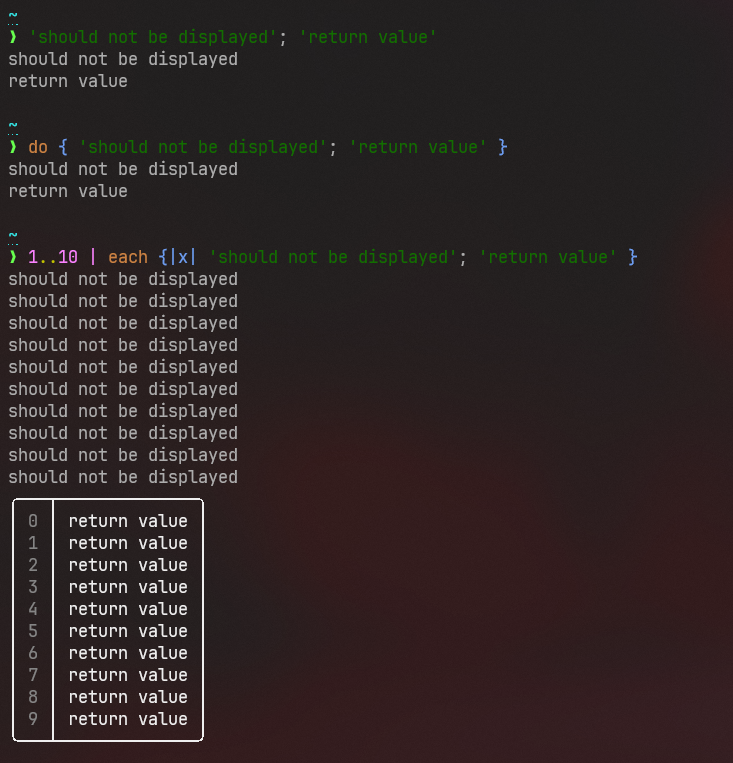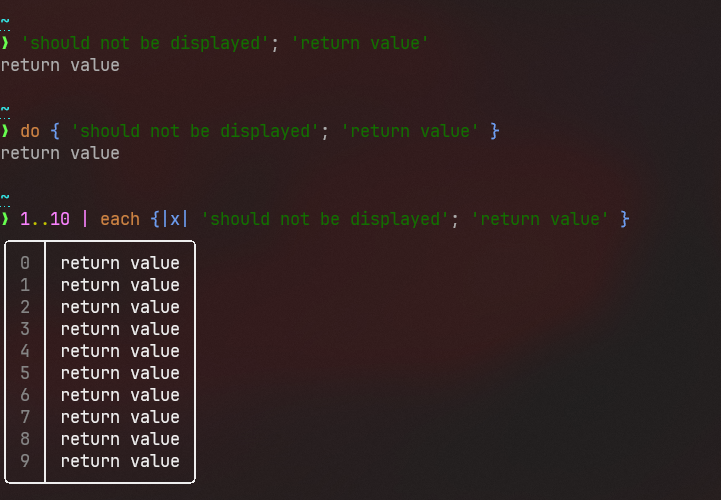forked from extern/nushell
# Description Change behavior of block evaluation to not print result of intermediate commands. Previously result of every but last pipeline in a block was printed to stdout, and last one was returned  With this change results of intermediate pipelines are discarded after they finish and the last one is returned as before:  Now one should use `print` explicitly to print something to stdout  **Note, that this behavior is not limited to functions!** The scope of this change are all blocks. All of the below are executed as blocks and thus exibited this behavior in the same way:  With this change outputs for all types of blocks are cleaned:  # User-Facing Changes All types of blocks (function bodies, closures, `if` branches, `for` and `loop` bodies e.t.c.) no longer print result of intermediate pipelines. # Tests + Formatting Don't forget to add tests that cover your changes. Make sure you've run and fixed any issues with these commands: - `cargo fmt --all -- --check` to check standard code formatting (`cargo fmt --all` applies these changes) - `cargo clippy --workspace -- -D warnings -D clippy::unwrap_used -A clippy::needless_collect` to check that you're using the standard code style - `cargo test --workspace` to check that all tests pass # After Submitting If your PR had any user-facing changes, update [the documentation](https://github.com/nushell/nushell.github.io) after the PR is merged, if necessary. This will help us keep the docs up to date.
302 lines
8.1 KiB
Rust
302 lines
8.1 KiB
Rust
use nu_test_support::fs::Stub::EmptyFile;
|
|
use nu_test_support::fs::Stub::FileWithContentToBeTrimmed;
|
|
use nu_test_support::playground::Playground;
|
|
use nu_test_support::{nu, pipeline};
|
|
|
|
#[test]
|
|
fn parses_csv() {
|
|
Playground::setup("open_test_1", |dirs, sandbox| {
|
|
sandbox.with_files(vec![FileWithContentToBeTrimmed(
|
|
"nu.zion.csv",
|
|
r#"
|
|
author,lang,source
|
|
JT Turner,Rust,New Zealand
|
|
Andres N. Robalino,Rust,Ecuador
|
|
Yehuda Katz,Rust,Estados Unidos
|
|
"#,
|
|
)]);
|
|
|
|
let actual = nu!(
|
|
cwd: dirs.test(), pipeline(
|
|
r#"
|
|
open nu.zion.csv
|
|
| where author == "Andres N. Robalino"
|
|
| get source.0
|
|
"#
|
|
));
|
|
|
|
assert_eq!(actual.out, "Ecuador");
|
|
})
|
|
}
|
|
|
|
// sample.bson has the following format:
|
|
// ━━━━━━━━━━┯━━━━━━━━━━━
|
|
// _id │ root
|
|
// ──────────┼───────────
|
|
// [object] │ [9 items]
|
|
// ━━━━━━━━━━┷━━━━━━━━━━━
|
|
//
|
|
// the root value is:
|
|
// ━━━┯━━━━━━━━━━━━━━━━━━━┯━━━━━━━━━━━━━━━━━━━━━━━━━┯━━━━━━━━━━┯━━━━━━━━━━
|
|
// # │ _id │ a │ b │ c
|
|
// ───┼───────────────────┼─────────────────────────┼──────────┼──────────
|
|
// 0 │ [object] │ 1.000000000000000 │ hello │ [2 items]
|
|
// 1 │ [object] │ 42.00000000000000 │ whel │ hello
|
|
// 2 │ [object] │ [object] │ │
|
|
// 3 │ [object] │ │ [object] │
|
|
// 4 │ [object] │ │ │ [object]
|
|
// 5 │ [object] │ │ │ [object]
|
|
// 6 │ [object] │ [object] │ [object] │
|
|
// 7 │ [object] │ <date value> │ [object] │
|
|
// 8 │ 1.000000 │ <decimal value> │ [object] │
|
|
//
|
|
// The decimal value is supposed to be π, but is currently wrong due to
|
|
// what appears to be an issue in the bson library that is under investigation.
|
|
//
|
|
|
|
#[cfg(feature = "bson")]
|
|
#[test]
|
|
fn parses_bson() {
|
|
let actual = nu!(
|
|
cwd: "tests/fixtures/formats",
|
|
"open sample.bson | get root | select 0 | get b"
|
|
);
|
|
|
|
assert_eq!(actual.out, "hello");
|
|
}
|
|
|
|
#[cfg(feature = "bson")]
|
|
#[test]
|
|
fn parses_more_bson_complexity() {
|
|
let actual = nu!(
|
|
cwd: "tests/fixtures/formats", pipeline(
|
|
r#"
|
|
open sample.bson
|
|
| get root
|
|
| select 6
|
|
| get b
|
|
| get '$binary_subtype'
|
|
"#
|
|
));
|
|
|
|
assert_eq!(actual.out, "function");
|
|
}
|
|
|
|
// sample.db has the following format:
|
|
//
|
|
// ╭─────────┬────────────────╮
|
|
// │ strings │ [table 6 rows] │
|
|
// │ ints │ [table 5 rows] │
|
|
// │ floats │ [table 4 rows] │
|
|
// ╰─────────┴────────────────╯
|
|
//
|
|
// In this case, this represents a sqlite database
|
|
// with three tables named `strings`, `ints`, and `floats`.
|
|
//
|
|
// Each table has different columns. `strings` has `x` and `y`, while
|
|
// `ints` has just `z`, and `floats` has only the column `f`. In general, when working
|
|
// with sqlite, one will want to select a single table, e.g.:
|
|
//
|
|
// open sample.db | get ints
|
|
// ╭───┬──────╮
|
|
// │ # │ z │
|
|
// ├───┼──────┤
|
|
// │ 0 │ 1 │
|
|
// │ 1 │ 42 │
|
|
// │ 2 │ 425 │
|
|
// │ 3 │ 4253 │
|
|
// │ 4 │ │
|
|
// ╰───┴──────╯
|
|
|
|
#[cfg(feature = "sqlite")]
|
|
#[test]
|
|
fn parses_sqlite() {
|
|
let actual = nu!(
|
|
cwd: "tests/fixtures/formats", pipeline(
|
|
r#"
|
|
open sample.db
|
|
| columns
|
|
| length
|
|
"#
|
|
));
|
|
|
|
assert_eq!(actual.out, "3");
|
|
}
|
|
|
|
#[cfg(feature = "sqlite")]
|
|
#[test]
|
|
fn parses_sqlite_get_column_name() {
|
|
let actual = nu!(
|
|
cwd: "tests/fixtures/formats", pipeline(
|
|
r#"
|
|
open sample.db
|
|
| get strings
|
|
| get x.0
|
|
"#
|
|
));
|
|
|
|
assert_eq!(actual.out, "hello");
|
|
}
|
|
|
|
#[test]
|
|
fn parses_toml() {
|
|
let actual = nu!(
|
|
cwd: "tests/fixtures/formats",
|
|
"open cargo_sample.toml | get package.edition"
|
|
);
|
|
|
|
assert_eq!(actual.out, "2018");
|
|
}
|
|
|
|
#[test]
|
|
fn parses_tsv() {
|
|
let actual = nu!(
|
|
cwd: "tests/fixtures/formats", pipeline(
|
|
r#"
|
|
open caco3_plastics.tsv
|
|
| first
|
|
| get origin
|
|
"#
|
|
));
|
|
|
|
assert_eq!(actual.out, "SPAIN")
|
|
}
|
|
|
|
#[test]
|
|
fn parses_json() {
|
|
let actual = nu!(
|
|
cwd: "tests/fixtures/formats", pipeline(
|
|
r#"
|
|
open sgml_description.json
|
|
| get glossary.GlossDiv.GlossList.GlossEntry.GlossSee
|
|
"#
|
|
));
|
|
|
|
assert_eq!(actual.out, "markup")
|
|
}
|
|
|
|
#[test]
|
|
fn parses_xml() {
|
|
let actual = nu!(
|
|
cwd: "tests/fixtures/formats",
|
|
pipeline(r#"
|
|
open jt.xml
|
|
| get content
|
|
| where tag == channel
|
|
| get content
|
|
| flatten
|
|
| where tag == item
|
|
| get content
|
|
| flatten
|
|
| where tag == guid
|
|
| get content.0.content.0
|
|
"#)
|
|
);
|
|
|
|
assert_eq!(actual.out, "https://www.jntrnr.com/off-to-new-adventures/")
|
|
}
|
|
|
|
#[cfg(feature = "dataframe")]
|
|
#[test]
|
|
fn parses_arrow_ipc() {
|
|
let actual = nu!(
|
|
cwd: "tests/fixtures/formats", pipeline(
|
|
r#"
|
|
dfr open caco3_plastics.arrow
|
|
| dfr into-nu
|
|
| first
|
|
| get origin
|
|
"#
|
|
));
|
|
|
|
assert_eq!(actual.out, "SPAIN")
|
|
}
|
|
|
|
#[test]
|
|
fn errors_if_file_not_found() {
|
|
let actual = nu!(
|
|
cwd: "tests/fixtures/formats",
|
|
"open i_dont_exist.txt"
|
|
);
|
|
// Common error code between unixes and Windows for "No such file or directory"
|
|
//
|
|
// This seems to be not directly affected by localization compared to the OS
|
|
// provided error message
|
|
let expected = "(os error 2)";
|
|
|
|
assert!(
|
|
actual.err.contains(expected),
|
|
"Error:\n{}\ndoes not contain{}",
|
|
actual.err,
|
|
expected
|
|
);
|
|
}
|
|
|
|
// FIXME: jt: I think `open` on a directory is confusing. We should make discuss this one a bit more
|
|
#[ignore]
|
|
#[test]
|
|
fn open_dir_is_ls() {
|
|
Playground::setup("open_dir", |dirs, sandbox| {
|
|
sandbox.with_files(vec![
|
|
EmptyFile("yehuda.txt"),
|
|
EmptyFile("jttxt"),
|
|
EmptyFile("andres.txt"),
|
|
]);
|
|
|
|
let actual = nu!(
|
|
cwd: dirs.test(), pipeline(
|
|
r#"
|
|
open .
|
|
| length
|
|
"#
|
|
));
|
|
|
|
assert_eq!(actual.out, "3");
|
|
})
|
|
}
|
|
|
|
#[test]
|
|
fn test_open_block_command() {
|
|
let actual = nu!(
|
|
cwd: "tests/fixtures/formats",
|
|
r#"
|
|
def "from blockcommandparser" [] { lines | split column ",|," }
|
|
let values = (open sample.blockcommandparser)
|
|
print ($values | get column1 | get 0)
|
|
print ($values | get column2 | get 0)
|
|
print ($values | get column1 | get 1)
|
|
print ($values | get column2 | get 1)
|
|
"#
|
|
);
|
|
|
|
assert_eq!(actual.out, "abcd")
|
|
}
|
|
|
|
#[test]
|
|
fn open_ignore_ansi() {
|
|
Playground::setup("open_test_ansi", |dirs, sandbox| {
|
|
sandbox.with_files(vec![EmptyFile("nu.zion.txt")]);
|
|
|
|
let actual = nu!(
|
|
cwd: dirs.test(), pipeline(
|
|
r#"
|
|
ls | find nu.zion | get 0 | get name | open $in
|
|
"#
|
|
));
|
|
|
|
assert!(actual.err.is_empty());
|
|
})
|
|
}
|
|
|
|
#[test]
|
|
fn open_no_parameter() {
|
|
let actual = nu!(
|
|
cwd: "tests/fixtures/formats",
|
|
r#"
|
|
open
|
|
"#
|
|
);
|
|
|
|
assert!(actual.err.contains("needs filename"));
|
|
}
|